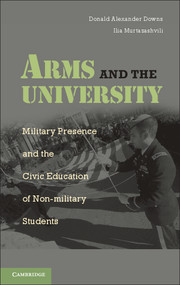Book contents
- Frontmatter
- Contents
- Tables
- Acknowledgments
- Part I A Normative and Pedagogical Framework
- Part II ROTC and the University
- 3 ROTC and the University
- 4 ROTC and the Ivies
- 5 ROTC and the Ivies
- 6 ROTC, Columbia, and the Ivy League
- 7 Post-DADT
- 8 Pedagogy and Military Presence
- 9 Winning Hearts and Minds?
- Part III Military History Examined
- Part IV Concluding Thoughts
- Index
- References
8 - Pedagogy and Military Presence
The Educational Influence of Student-Soldiers in Their Own Words
Published online by Cambridge University Press: 05 June 2012
- Frontmatter
- Contents
- Tables
- Acknowledgments
- Part I A Normative and Pedagogical Framework
- Part II ROTC and the University
- 3 ROTC and the University
- 4 ROTC and the Ivies
- 5 ROTC and the Ivies
- 6 ROTC, Columbia, and the Ivy League
- 7 Post-DADT
- 8 Pedagogy and Military Presence
- 9 Winning Hearts and Minds?
- Part III Military History Examined
- Part IV Concluding Thoughts
- Index
- References
Summary
Since we are of the opinion that the military is going to be with us in the U.S. for some time, we feel that any “reform” that makes it difficult for a Princeton English major or a Pittsburgh philosophy major to become an officer is most undesirable. . . . Which brings us to our third conclusion. If you don’t like the way the military functions, you can’t expect it to improve by insulating yourself from it.
– Ed Berger et al.It is easy for people to become detached from things that they have no interaction with.
– Anonymous ROTC cadetIn Chapter 2, we considered theoretically the various ways in which military presence can contribute to liberal and civic education, focusing on four ways in particular. First, military presence can be a means of empirically “understanding the military and national defense,” which includes, among other things, “education in the regime.” The latter entails understanding the responsibilities necessary for the sustenance and protection of the regime and its fundamental principles. Second, students have opportunities to learn about “human nature, society, and the meaning of life” by encountering or studying the institution that is most closely associated with the conduct of war. Third, appropriate military presence can confront students with “moral difficulties in liberal democracy,” such as the moral conundrums regarding the use of force and the relationship between the threat or deployment of legitimate violent force and the public good. (The theory of moral realism best captures this theme.) Finally, military presence can be a source of “intellectual and moral diversity on campus.” Based on these reasons, we construed military presence as a source of productive friction and as an example of what Hans Morgenthau and his progeny consider the “higher practicality,” which entails applying philosophical and ethical thought to historical and contemporary problems that reflect fundamental human, social, and political dilemmas.
- Type
- Chapter
- Information
- Arms and the UniversityMilitary Presence and the Civic Education of Non-Military Students, pp. 226 - 255Publisher: Cambridge University PressPrint publication year: 2012



